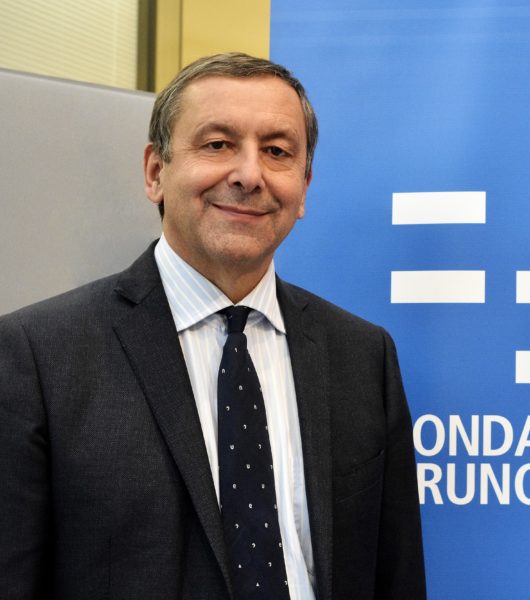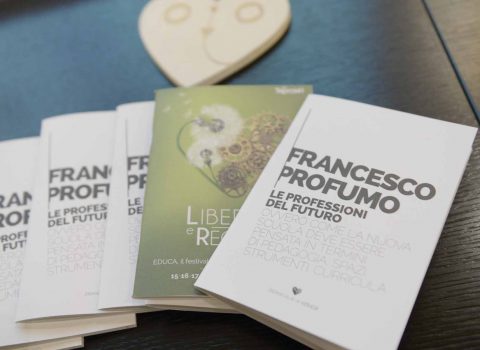EDUCA towards a new Digital School
Which school will come from digital technology? The shared reflection of Educa starts from #scuoladigitaletrentina and expands to the entire national system.
The reflections on the New School upon the coming of digital technologies is the focus of two events coordinated by FBK President, Francesco Profumo, at the Educa Festival, to be held on April 8 at Palazzo dell’Istruzione in Rovereto.
The first event will gather the outcomes of #scuoladigitaletrentina program towards the creation of its digital plan. The second one will propose a unanimous reflection that extends from Trentino to the entire Country system thanks to the talks of a panel of national experts such as Sabrina Bono, Chief of Cabinet of the Minister of Education, Giovanni Biondi, President of Indire, Rosa Maria Bottino, Director of the Institute for Educational Technology of CNR, Mario Giacomo Dutto, Chairman of the Scientific and Technical Committee of IPRASE Salvatore Giuliano, Principal of the Majorana High School in Brindisi and creator of the Book in progress method.
#SCUOLADIGITALETRENTINA
Starting at 9.30 am, #SCUOLA DIGITALE TRENTINA collects the results of a participatory process in the development of the new Plan for digital school in Trentino sponsored by the Department of Knowledge of the Autonomous Province of Trento and by the Provincial Institute for research and educational experimentation (IPRASE).
The meeting is the last step in an exchange of experiences effort of the various communities for the definition of the digital school plan: teachers,
principals and national experts participated in three workshops aimed at the joint creation of a guideline document for the new launch of an overall innovation strategy in the school system, where expertise and technology combine with each other turning into a system action towards innovation and change.
The program has also been enriched by a semantic analysis of projects under way in the Trentino school system, conducted by FBK researchers coordinated by Sara Tonelli from the Digital Humanities Unit, which will be presented in the morning session.
The meeting will also include the testimonies of Elizabeth Nanni, who coordinated the participatory process for Iprase, and some representatives of the Trentino School system that will illustrate successful case studies which may become exportable models for other educational institutions.
HORIZON 2030: THE CHALLENGES OF THE NEW SCHOOL
Which school will come from digital technology? It is right to speak of a tool revolution or should we think a new pedagogy, supported by new spaces and based on skills required by the jobs of the future? What skills will need to be to acquired and which challenges will need to be faced not only by teachers, principals and families, but by the entire school system?
The 11.00 am roundtable will discuss the outcomes emerged from the Trentino School process toward digital technology by collecting a multi-voicereflection that extends from Trentino to the entire national system. The challenge of this meeting is also to deepen the educational concept behind the new digital school, beyond the immediate technological aspect, and thus propose a method, and replicable and scalable models that could be applied far from the area from which this reflection starts.
The speakers of Horizon 2030
Giovanni Biondi President, since 2013, of Indire (National Institute for Educational Documentation, Innovation and Research), the oldest research institute of the Ministry of Education. From 2009 to 2013, he was Head of the Department for planning and management of human and financial resources of the Ministry of Education. He has served on numerous international bodies and, since 2009, he has been the chairman of EUN (European Schoolnet), network
consisting of 30 European education ministries. He has dealt with new technologies in teaching since 1983, when, on behalf of the Catholic University of Milan, he held one of the first courses in Italy on the Logo programming language. He is the author of works such as La scuola dopo le nuove tecnologie (The school after the new technologies, Apogeo, 2007) A scuola con la lavagna interattiva multimediale (At school with the interactive whiteboard Multimedia). Nuovi lingiaggi per rinnovare la didattica (New languages to innovate teaching, Giunti, 2008) Dall’aula all’ambiente di apprendimento (from the classroom to the learning environment, Altralinea, 2016).
Sabrina Bono Chief of Cabinet of the Ministry of Education. A lawyer, Law and Political Science graduate, she has held at the Ministry of Education, University and Research, the positions of Head of Department for planning and management of human, financial and instrument resources from 2013 to today, and Deputy Chief of Cabinet Vicar, from 2008 to 2013. From 2006 to 2008, she was Deputy Head of Cabinet of the Ministry of Communications.
Rosa Maria Bottino Research Manager with the National Research Council (CNR); Director of the Institute for Educational Technology (ITD-CNR) and Research Area President of CNR-Genoa. She has extensive research experience in the field of educational technology which is backed by her scientific production (over 150 publications including more than a hundred in the international arena), by the awards che has received, her collaborations and projects both at the international and national level, by her participation in the editorial board of international journals in the field of educational technology. She carries out, in her capaciy as an expert, evaluation activities for project and research institutes at European and international level.
Mario Giacomo Dutto Chairman of the Scientific Technical Committee of IPRASE and member of the Scientific Committee of CeRiForm (research center on training of the Catholic University). He has carried out research for various organizations:Fondazione G. Pastore; CEDEFOP
in Berlin and Thessaloniki and for the Foundation for the Improvement of Living and Working Conditions in Dublin. He has been a technical inspector for the Trentino school system and for the Ministry of Education; general manager for both the Ministry of University
and Research, and for regional education offices. He has written hundreds of articles on education policy issues and a number of books including Acqua alle funi (2013), Vela d’altura (2016).
Salvatore Giuliano Principal of the Ettore Majorana High School of Brindisi. Creator of the Book in Progress project: textbooks written by teachers based on the pupils’ learning pace. The Book in Progress project now involves approximately 150 schools throughout Italy. The contents of Book in Progress are accessible in print and interactive digital formats.
You may visit our website , www.fbk.eu, for full information on the EDUCA events curated by FBK
Towards a new school
ICT4G workshops for the Schools Program: Cibopoli and Code Hour
Domosens for EDUCA


